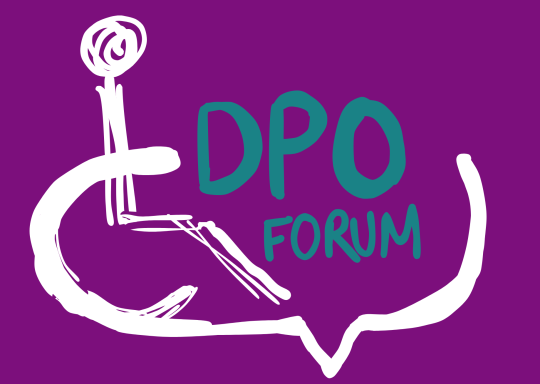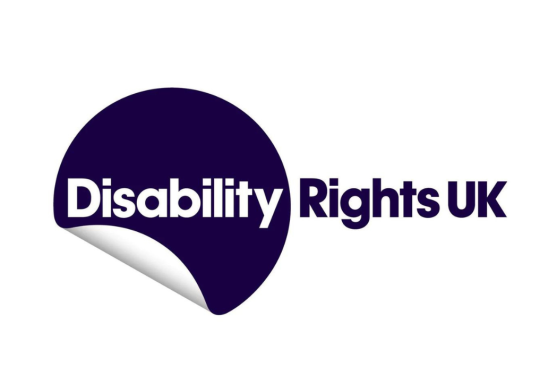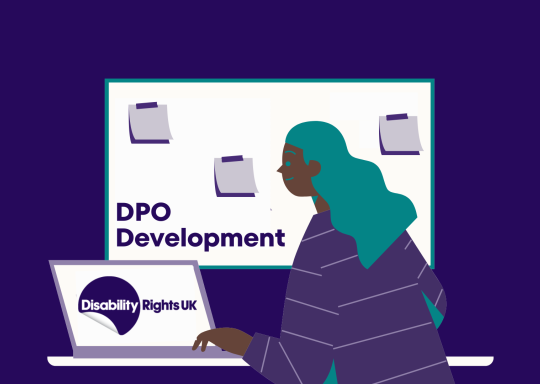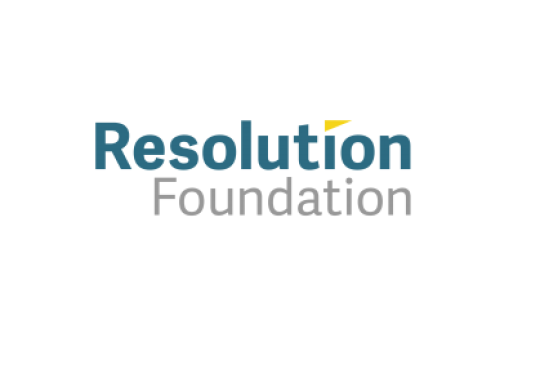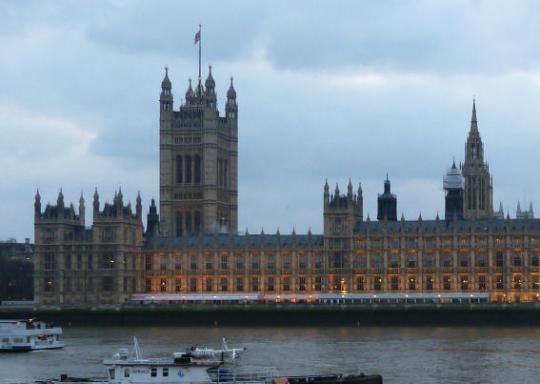Poverty
Disability Rights UK has been instrumental in creating the Disability Poverty Campaign Group (DPCG) a coalition of DPOs, disability charities and allies, all working together to highlight and work towards solutions to the current cost-of-living crisis.
Context
Disabled people face discrimination in all aspects of our lives including employment, inadequate benefit levels and unfair social care charges. Over a decade of Government cuts to social provision has left Disabled people without access to essential services, income and housing, and caused or contributed to extreme hardship and sometimes death. But things are getting much, much worse, as the costs of food, energy and housing are rising exponentially.
Many Disabled people are skipping meals or living in cold homes, due to a toxic mix of low income levels and ever higher expenditure. The majority of food bank users are Disabled people.
Disabled people’s energy costs are often higher than those of non-disabled people because we may need to run the heating more (to cope with lower mobility or prevent severe illness due to weakened immune systems) and to charge essential medical and mobility equipment. This means the increases in energy costs hit us harder.
Disabled people are missing Hospital and GP appointments due to the cost-of-living crisis, and evidence is now showing that people are not purchasing prescribed medication due to its cost.
The average Disabled person already spends £1010 per month more than a non-disabled person to achieve the same standard of living. For one in five of us, these extra costs amount to more than £1,122 a month.
As the cost-of-living crisis continues with no sign of it slowing down, even more of us will be forced to choose whether to heat our homes or whether to eat: a choice no-one should ever have to make.
Key Evidence
The impact of rising energy costs on people at the end of life, a report from Marie Curie K406-PovertyEnergyReport-FinalVersion.pdf
A report in January 2023 by the Resolution Foundation confirmed that Disabled people are hardest hit by the Cost-of-living crisis Costly differences • Resolution Foundation
More than a million people in the UK have experienced life-threatening asthma attacks after cutting back on medicine, heating and food amid the soaring cost of living crisis, a survey by Asthma and Lung have found
There have been warnings from other health charities about the impact of the cost of living crisis. A survey by the MS Society found that one in five people with multiple sclerosis did not have enough money to start the medication or treatments they needed with a third reducing or stopping treatments or therapies, greatly putting their health at risk.
Macmillan Cancer Support found that around 2 million people with cancer are already concerned about the cost of their bills over the coming year. Heating for cancer patients as well as those Disabled people who cannot regulate their own body temperature, is essential.
Research carried out by DPCG member Leonard Cheshire in April 2022 found that
- More than 600,000 disabled people in the UK are estimated to have £10 or less per week to pay for food and other costs.
- Around a quarter surveyed, had missed meals or not heated their homes.
Healthwatch UKs Impact of the cost of living crisis on access to healthcare 20230221 Cost of living presentation to disability benefits consortium.pptx - Google Slides
Marie Curie report on cost of living and living with a terminal illness. Nobody should die in poverty (mariecurie.org.uk)
Citizens Advice found that when vulnerable consumers struggle with their payments, energy suppliers are failing to adequately support them. As financial pressures grow, many energy customers are struggling to meet the cost of ongoing usage, let alone payments towards arrears.
This led to suppliers increasingly forcing customers onto prepayment meters. Although new Ofgem legislation was extended with further protections aimed to prevent involuntary Pre-Payment meter installations for the most vulnerable households, the issue of PPM usage is a major concern, as the legisaltion is only "voluntary" for suppliers.
This is extremely challenging for Disabled customers, who can find themselves without the money to top up meters and are then forced to disconnect.
A report by the Family Fund that polled 4,264 families with a disabled child or seriously ill child, found that nine in 10 families are struggling, or falling behind on their regular household bills and many are forced to forego living essentials such as food, heating, basic furniture like beds, flooring, washing machines and fridges, to try to make ends meet. Over half of parents and carers (54%) report skipping or cutting the size of their meals because there wasn’t enough money for food and more than one in ten (13%) say they’ve had to cut back on essential items for their disabled children.
The New Money and Pensions Service report has found that almost three quarters (74 per cent) of people living with mental health problems now say they are struggling to keep up with bills and credit commitments while more than half (57 per cent) of people who are often using credit to purchase everyday essentials have a mental health problem.
Research by the Joseph Rowntree Foundation in their UK poverty report in 2022 found that poverty is consistently higher amongst Disabled people.
A startling report by Joseph Rowntree Foundation this year has found that poverty has increased, close to pre-pandemic levels.
Disabled people are more likely to be in low-paid jobs according to Leonard Cheshire
The cost-of-living crisis is spiralling and a series of policies are proposed.
Policy asks- DR UK/DPCG
1. An increase in benefit levels to ensure that no disabled person or carer has to make financial decisions which put their physical and mental health in danger. This should include:
- Benefits ‘uprating’ should be in line with actual inflation. The uprating must apply to legacy benefits as well as Universal Credit.
- Abolish ‘no recourse to public funds’ status, which forces Disabled people who are seeking asylum into poverty.
- The government should urgently carry out an assessment of the additional costs Disabled people face (as promised in the National Disability Strategy), considering the effects of the current cost of living increases.
- The government should increase ‘extra costs’ disability benefits so that they cover the additional costs identified, as they are currently insufficient.
- Carers for Disabled people should all be able to access an allowance appropriate to the minimum wage; no one should be unpaid for caring.
- Carers who are being pursued for overpayments of carers allowance must have their debts written off.
- Reform the benefits system to make the process easier, faster and far more supportive and accessible.
2. Action to support Disabled people’s access to essential energy needs. No disabled person should be in fear of fuel poverty, enforced debt recovery or having energy cut off. This should include:
- The government should review the package of measures announced in the Energy Bills Support Scheme. In particular, the £200 repayable ‘discount’ (the loan portion) should be delivered as a grant for Disabled people on means-tested benefits.
- The Household Support Fund must be permanently extended from September to support low-income families, with an increase from central government.
- The new guidelines issued by Ofgem on forced Pre-Payment meter installations for energy firms are currently voluntary, which still allows for potential force fitting to reclaim fuel debt. All guidelines must be mandatory to protect all energy-vulnerable customers.
- The government must reverse the proposed removal of eligibility for the Warm Home Discount from over 290,000 PIP, DLA, and AA recipients.
- In the context of the ongoing energy price spike, the government should introduce specific grant-based help for Disabled people whose impairments mean they need to use more energy or an additional targeted payment for those with higher energy costs.
- Official methodologies for calculating fuel poverty must be adjusted to account for Disabled people’s additional energy needs and other disability-related costs.
- Energy companies and Ofgem should work with Disabled consumers and Disabled People’s Organisations to develop appropriate and fairer ways of working with us, including delivering disability equality training for all customer-facing representatives of energy firms, deliver an urgent review of their customer base to locate and support Disabled customers, and ensure that all communications are available in accessible formats.
- The immediate implementation of a fixed social energy tariff to be automatically made available to those who need it including people on means tested benefits, disability benefits, and Carer’s Allowance.
3. Better and fairer investment in social care, which should be free at point of use. This should include:
- The government should introduce an independent living service to provide genuine choice for Disabled people to live where we want, with the care and support we need, provided free at point of use.
- Government should immediately exempt means-tested benefits and extra costs benefits (PIP) from the social care income means test.
- Government should regularly increase the Minimum Income Guarantee (MIG) to keep it in line with inflation.
- Local councils should immediately change Direct Payments so they are paid gross not net of the individual’s contribution, to ensure people can receive all of the care and support they have been assessed as needing.
- Local councils should stop using debt recovery actions against people with care charge arrears.
Target Decision Makers
Stephen Timms Minister of State (Minister for Social Security and Disability)
Utility watchdog Ofgem Welcome to Ofgem - the energy regulator for Great Britain | Ofgem
Department for Energy Security & Net Zero / The Rt Hon Edward Miliband MP
Office of the Prime Minister Sir Keir Starmer
UK Government Disability Unit disabilityunit@cabinetoffice.gov.uk
Partners and Allies
The DPCG has over 30 coalition members, including SCOPE, the Food Foundation, The Trussell Trust, Mencap, Joseph Rowntree, Leonard Cheshire, Women’s budget group, Inclusion Scotland, and many more national organisations.
End the Fuel Poverty Coalition End Fuel Poverty Coalition – For energy efficient homes, decent incomes and low cost fuel for low income households.
Disability Benefits Consortium Disability Benefits Consortium – Working together towards a fairer welfare system for disabled people
National Energy Action National Energy Action (NEA) - the UK's leading fuel poverty charity
Marion Fellows SNP Marion Fellows MP – SNP Member of Parliament for Motherwell & Wishaw
Greater Manchester Coalition of Disabled people Greater Manchester Coalition of Disabled People | (gmcdp.com)
Campaign Action
Campaign calling for a ban on Pre-Payment meter warrants. Action network enabling individuals to write to their MP asking for the forced installation of PPMs to STOP. Take action - Stop energy suppliers forcefully installing prepay meters on disabled customers - Action Network
Ongoing social media campaign around the PPM ban (16) Disability Rights UK on Twitter: "The number of people from Scotland on prepayment meters being forced to go without food, heat & medicine has skyrocketed, a new @CitAdviceScot report shows. The ban on PPM forced installation ends on 31st March, it must not re-start. Write to your MP: https://t.co/EupyIYVeMm https://t.co/ldpojGGkOr" / Twitter
Campaign was revised to coincide with Ofgem’s proposed lifting of PPM installation ban on march 31st. (1) Disability Rights UK on Twitter: "In 31 days time the forced installation of Prepayment meters in homes by warrant could re-start. Debt collectors were breaking into homes of financially vulnerable & Disabled people. A PERMANENT BAN on forced installation is needed. Write to your MP: https://t.co/EupyIYVeMm https://t.co/QtZnu5kT3Q" / Twitter
Letter to Grant Shapps on PPMs letter to the Grant Shapps on Pre-payment meters.pdf
The DPCG have also engaged with Ofgem and are now part of their stakeholder team and their consumer groups call, representing the countries Disabled community. We hold regular meetings.
APPG event at Portcullis House London to highlight the issues of Disability poverty with MPs.
Gave evidence to the youth select committee on poverty and how it is affecting young Disabled people.
DPCG collaborated on a Newsnight Special on carers debts in which co-lead Dan White apperared.
Letter to new PM Keir Starmer Letter to new PM Keir Starmer
Letter to The Chancellor about the need to continue the Household Support Fund past Sept. 2024 letter to the Chancellor on the HSF.pdf
Letter from End Fuel Poverty Coalition / DPCG signatory on winter fuel payments to Rachel Reeves Letter to the Chancellor on Winter Fuel Payments (endfuelpoverty.org.uk)
Letter to PM Rishi Sunak letter to PM Rishi Sunak.pdf
Letter to the new Labour Gov. requesting involvement in the new child poverty taskforce Letter for involvement in the poverty taskforce.pdf
Letter to PM Keir Starmer requesting co-operation on tackling poverty DPCG letter to PM Keir Starmer.pdf
Letter to Secretary of State for work and pensions requesting extension on Household Support Fund DPCG letter to Secretary of State for Work and Pensions.pdf
Letter to the Chancellor of the Exchequer on the pre-budget early 2024 DPCG pre-statement letter to the Chancellor Jeremy Hunt.pdf
Follow up letter to Claire Couthino Energy Secretary on energy followw up letter to Claire Couthino energy secretary.pdf
Letter to the chancellor on measures to support and protect Disabled people from the cost-of-living crisis Letter to Chancellor Jeremy Hunt.pdf
Report sent to government departments, MPs along with any press release Disability Poverty Group report.pdf






